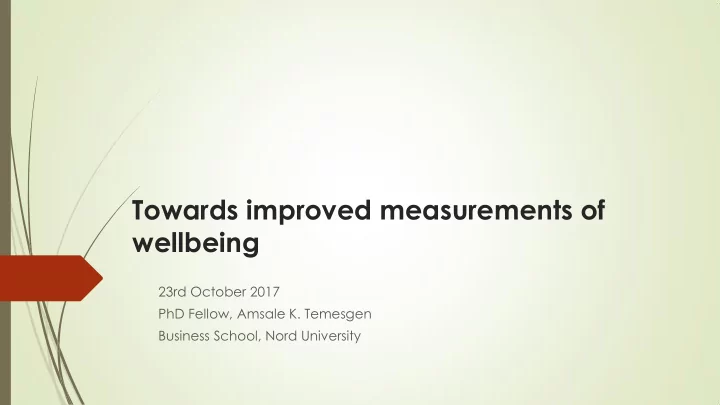

Towards improved measurements of wellbeing 23rd October 2017 PhD Fellow, Amsale K. Temesgen Business School, Nord University
What is wellbeing? Quality of life, living standards, human development, social welfare, utility, life satisfaction, needs fulfillment, empowerment, capability expansion and more recently happiness. Wellbeing can be generally defined as a description of the state of individuals ’ life situation (McGillivray 2007). Intricately associated with our conceptualization of ‘ the good life ’ Social and environmental consequences.
Three traditions Three traditions of conceptualizing wellbeing: Neoclassical Economics Humanist tradition Subjective wellbeing
Neoclassical Economics Linked to the philosophical school of utilitarianism. Most prominent proponents are Jeremy Bentham(18th century) and John Stuart Mill (19th century). Utilitarianism claims that ‘ pleasure is the only intrinsic good and that pain is the only intrinsic bad’ ( Sinnott-Armstrong 2015, p. 2) The balance between pleasure and pain is utility. Utilitarianism: Society’s wellbeing is seen as the sum of the utilities of individuals. ‘The greatest happiness for the greatest number of people ’. Utility Preferences Choice of consumption goods. Economic (GDP) growth Human progress
Criticisms of GDP Disregards income disparity. Covers only economic transactions not social activities. Does not cover useful non-market activities. Non-productive activities such as pollution and its clean-up boosts GDP. Does not include the value of nature/ecosystems and community.
The Humanist Tradition Philosopher Johan Rawls (1971) took the focus to universal human needs. Wellbeing is ‘ the possession of «social primary goods» or things that rational human beings need or desire - a concept similar to utility – but the method of aggregation was revolutionary. Maximization of societal wellbeing requires ‘ maximizing the welfare level of the worst off person’ (Sen 1974, p.302). Capabilities approach (Amartya Sen and Martha Nussbaum) inspired by Rawlsian philosophy (Robyens 2005). Sen: human agency. Wellbeing ‘ the ability to do valuable acts or reach valuable states of being ’ (Sen 1993, p. 30)
Humanist tradition Capabilities = freedom to choose Functionings = doings and beings. Human Development Index (education, life expectancy, income) Criticisms: Does not reflect ecological considerations Income inequality Opens itself to criticisms of GDP Satisfaction of fundamental human needs Maslow (1954) Max-Neef (1991)
Subjective wellbeing Subjective wellbeing Subjective well- being (SWB): ‘an individual’s own assessment of his or her own life – not the judgment of experts – and includes satisfaction, pleasant affect, and low negative affect’ ( Diener 2004 in Bruni 2010). Community wellbeing (satisfaction with community and community life domains) (Sirgy 2010, 2011). Global Happiness Report.
Indicators of wellbeing Type of measurement Level of aggregation Indicators Examples At the level of the individual Capital (human, economic, social, built) education, savings, social ties, housing At the level of the community Community services fire protection, police, education Objective measurements Economic conditions Job opportunities Social conditions Crime statistics At the level of the individual in relation to own Positive affect, negative affect, Satisfaction with life on a scale life evaluation of life from 1-10 Subjective measurements At the level of the individual in relation to Community wellbeing, community Satisfaction with community and community commitment and social ties community life
Thank you for your attention!
Recommend
More recommend